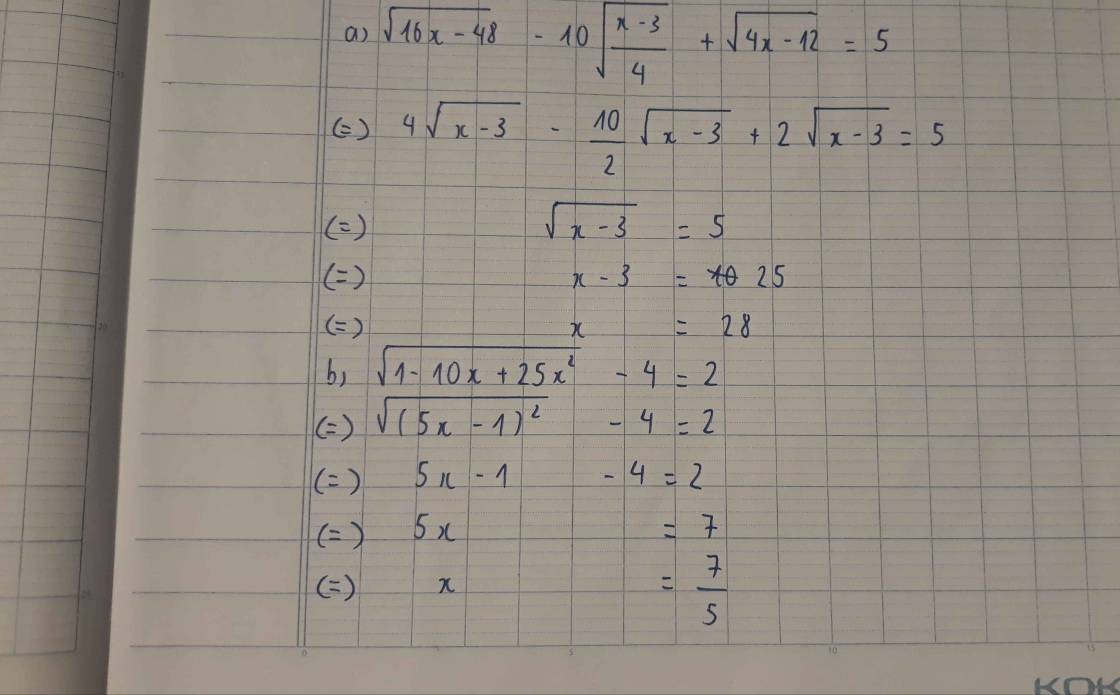\(\sqrt[]{\dfrac{\text{1}}{\text{4}}}\).\(\sqrt[]{\text{1,21}}\)-\(\sqrt[]{\text{0,09}}\)+\(\sqrt[]{\text{36}}\)
Hãy nhập câu hỏi của bạn vào đây, nếu là tài khoản VIP, bạn sẽ được ưu tiên trả lời.


\(=-5\cdot\dfrac{1}{2}+0-5\cdot\dfrac{6}{5}=-\dfrac{5}{2}-6=-\dfrac{17}{2}\)

\(=\left(\dfrac{3}{2}\cdot\dfrac{2}{5}+2\cdot\dfrac{1}{5}\right):\dfrac{3}{8}=\left(\dfrac{3}{5}+\dfrac{2}{5}\right)\cdot\dfrac{8}{3}=\dfrac{8}{3}\)

\(=\dfrac{8-4\sqrt{3}-3\left(\sqrt{3}-1\right)-2}{\sqrt{3}-1-2}=\dfrac{6-4\sqrt{3}-3\sqrt{3}+3}{\sqrt{3}-3}\)
\(=\dfrac{-7\sqrt{3}+3}{\sqrt{3}-3}=3\sqrt{3}+2\)

a.\(A=\dfrac{x^2-4x+4}{x^3-2x^2-\left(4x-8\right)}=\dfrac{\left(x-2\right)^2}{x^2\left(x-2\right)-4\left(x-2\right)}=\dfrac{\left(x-2\right)^2}{\left(x^2-4\right)\left(x-2\right)}=\dfrac{x-2}{\left(x-2\right)\left(x+2\right)}=\dfrac{1}{x+2}\)
\(A=\dfrac{\left(x-2\right)^2}{x^2\left(x-2\right)-4\left(x-2\right)}\left(x\ne\pm2\right)\\ A=\dfrac{\left(x-2\right)^2}{\left(x-2\right)^2\left(x+2\right)}=\dfrac{1}{x+2}\\ B=\dfrac{x+2-x+\sqrt{x}-1}{\left(\sqrt{x}+1\right)\left(x-\sqrt{x}+1\right)}\cdot\dfrac{4\sqrt{x}}{3}\left(x>0\right)\\ B=\dfrac{4\sqrt{x}\left(\sqrt{x}+1\right)}{3\left(\sqrt{x}+1\right)\left(x-\sqrt{x}+1\right)}=\dfrac{4\sqrt{x}}{3\left(x-\sqrt{x}+1\right)}\)

Giải bằng bất đẳng thức Cô si: (ĐK: \(x^2-x+1\ge0;-2x^2+x+2\ge0;x^2-4x+7\)
Ta có: \(x^2-x+1+1\ge2\sqrt{x^2-x+1}\Leftrightarrow\sqrt{x^2-x+1}\le\dfrac{x^2-x+2}{2}\left(1\right)\\ T,T:\sqrt{-2x^2+x+2}\le\dfrac{-2x^2+x+3}{2}\left(2\right)\\ \left(1\right);\left(2\right)\Rightarrow\sqrt{x^2-x+1}+\sqrt{-2x^2+x+2}\le\dfrac{x^2-x+2-2x^2+x+3}{2}=\dfrac{-x^2+5}{2}\\ \Rightarrow\sqrt{x^2-x+1}+\sqrt{-2x^2+x+2}-\dfrac{x^2-4x+7}{2}\le\dfrac{-x^2+5-x^2+4x-7}{2}\\
=\dfrac{-2x^2+4x-2}{2}\\
=-x^2+2x-1
\\
\Rightarrow-\left(x-1\right)^2\ge0\)
Điều này chỉ thỏa 1 điều kiên khi x-1=0 ⇔x=1(nhận
Vậy x=1 là nghiệm cuả phương trình

\(=4\cdot5-2\cdot\dfrac{2}{3}=20-\dfrac{4}{3}=\dfrac{56}{3}\)

b) (4√x + 4)/(x + 2√x + 5) ≥ 1
⇔ (4√x + 4)/(x + 2√x + 5) - 1 ≤ 0
Do x ≥ 0 ⇒ x + 2√x + 5 > 0
⇒ (4√x + 4)/(x + 2√x + 5) - 1 ≤ 0
⇔ (4√x + 4) - (x + 2√x + 5) ≤ 0
⇔ 4√x + 4 - x - 2√x - 5 ≤ 0
⇔ -x + 2√x - 1 ≤ 0
⇔ -(x - 2√x + 1) ≤ 0
⇔ -(√x - 1)² ≤ 0 (luôn đúng)
Vậy (4√x + 4)/(x + 2√x + 5) ≤ 1 với mọi x ≥ 0
a: \(P=\dfrac{x+8\sqrt{x}+8-x-4\sqrt{x}-4}{\sqrt{x}\left(\sqrt{x}+2\right)}:\dfrac{x+\sqrt{x}+3+\sqrt{x}+2}{\sqrt{x}\left(\sqrt{x}+2\right)}\)
\(=\dfrac{4\left(\sqrt{x}+1\right)}{x+2\sqrt{x}+5}\)
b: 4(căn x+1)>=4
x+2căn x+5>=5
=>P<=4/5<1

\(=\dfrac{1}{2}.1,1-0,3+6=6,25\)